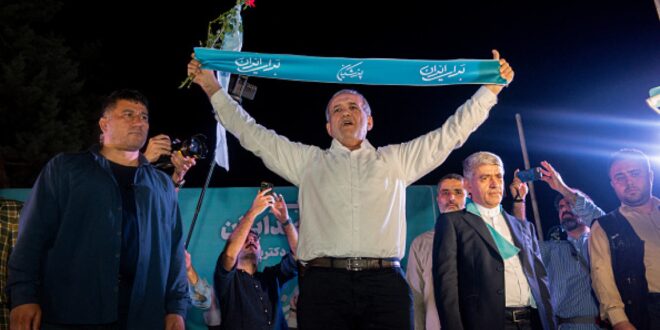Iran’s reformist candidate Masoud Pezeshkian has won a runoff presidential election against ultraconservative Saeed Jalil- here’s what to know.
Masoud Pezeshkian, Iran’s only reformist candidate in the recent presidential election, has emerged from relative obscurity to become the ninth president of the Islamic Republic.
Pezeshkian, 69, secured about 53.6 percent of the vote in a runoff against ultraconservative Saeed Jalili. In the first round on June 28, Pezeshkian led the polls against three conservative candidates, surprising both supporters and rivals.
He replaces the late ultraconservative president Ebrahim Raisi, who died in a helicopter crash in May.
“The difficult path ahead will not be smooth except with your companionship, empathy, and trust. I extend my hand to you,” Pezeshkian said on X, after previously stating he would “extend the hand of friendship to everyone” if he won.
After years of conservative domination, the president-elect’s victory indicates a strong move towards modernisation across Iran.
Pezeshkian assumes the presidency amid heightened regional tensions over the Gaza war, disputes with the West over Iran’s nuclear program, and domestic discontent over the sanctions-hit economy.
Here’s a breakdown by The New Arab on what to know about the Iranian leader:
Who is Pezeshkian?
Pezeshkian has focused on minority ethnic groups and served in the Iran-Iraq war. He also became a heart surgeon and previously served as head of the Tabriz University of Medical Sciences.
He began his political career as a deputy health minister and later health minister under reformist President Mohammad Khatami.
Pezeshkian’s involvement in the hard-liner and reformist struggle was first notably seen during the autopsy of Zahra Kazemi, a detained and tortured journalist who died in custody.
Elected as a lawmaker in 2006, Pezeshkian served as a deputy parliament speaker and supported reformist causes while maintaining an independent stance.
However, he supported Iran’s paramilitary Revolutionary Guard and on one occasion wore its uniform to parliament.
He additionally praised the IRGC’s actions against the US after shooting down an American drone in 2019, saying it “delivered a strong punch in the mouth of the Americans and proved to them that our country will not surrender”.
Pezeshkian registered for the presidency in 2011 but withdrew. In 2021, he was barred from running, leading to Ebrahim Raisi’s win.
The path to Pezeshkian’s win
49.8 percent of eligible voters cast their ballots in Iran’s runoff presidential election, according to the final vote count results announced by the Interior Ministry.
30,530,157 ballots were cast on Friday, out of which Masoud Pezeshkian secured 16,384,403 votes (53.6%) and… https://t.co/fXjHoKfBWc pic.twitter.com/nsA3FEKbyZ — Iran International English (@IranIntl_En) July 6, 2024Amid ongoing regional and domestic challenges, Pezeshkian’s rise to the presidency brings hope to Iran’s reformists.
Iran’s main reformist coalition supported him, with former presidents Mohammad Khatami and Hassan Rouhani also endorsing Pezeshkian.
His opponent Jalili was deemed to be the favorite to win Friday, after Conservatives dominated the ballot in the initial snap election and endorsed the hard-liner.
However, Pezeshkian saw support being extended from moderate conservatives to mobilise a higher turnout for his base.
He publicly criticised the Raisi government for its handling of the death of Iranian Kurd Mahsa Amini in custody, arrested for allegedly violating Iran’s dress code. On social media platform X, he called for an investigation into her death.
Throughout his recent campaign, he has maintained his stance, condemning the enforcement of mandatory hijab laws imposed since Iran’s 1979 Islamic revolution.
“We oppose any violence towards our sisters and daughters,” he stated, promising to ease internet restrictions and include ethnic minorities in his government.
Campaigning on Pezeshkian’s behalf was Mohammad Javad Zarif, Iran’s former foreign minister instrumental in the 2015 nuclear deal with world powers, which collapsed three years later.
Pezeshkian advocates for reviving the agreement to end Iran’s isolation, stating in a televised interview: “Lifting sanctions will improve people’s lives, while their continuation will only make life harder.”
Supporters of the newly elected president refer to his background as an Azeri, an ethnic minority in Iran, as a key reason they believe he can unify the country.
“I will do everything possible to look at those who were not seen by the powerful and whose voices are not heard. We will make poverty, discrimination, war, lies and corruption disappear from this country,” he said during a campaign rally this week.
Mehrzad Boroujerdi, an expert on Iran and dean at Missouri University of Science and Technology, told The Washington Post that the hardliner-reformist struggle that Pezeshkian first grappled with is likely to continue during his presidency.
“The conservatives will try to create obstacles from day one,” Boroujerdi said.
“He won’t have much of a honeymoon… They will apply the brakes to whatever Pezeshkian will try to do.”
 Eurasia Press & News
Eurasia Press & News



